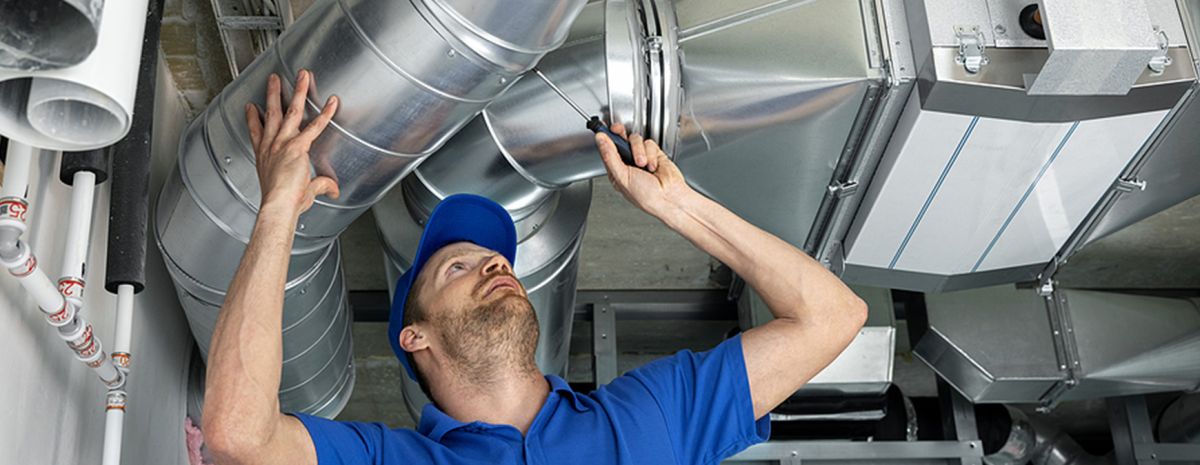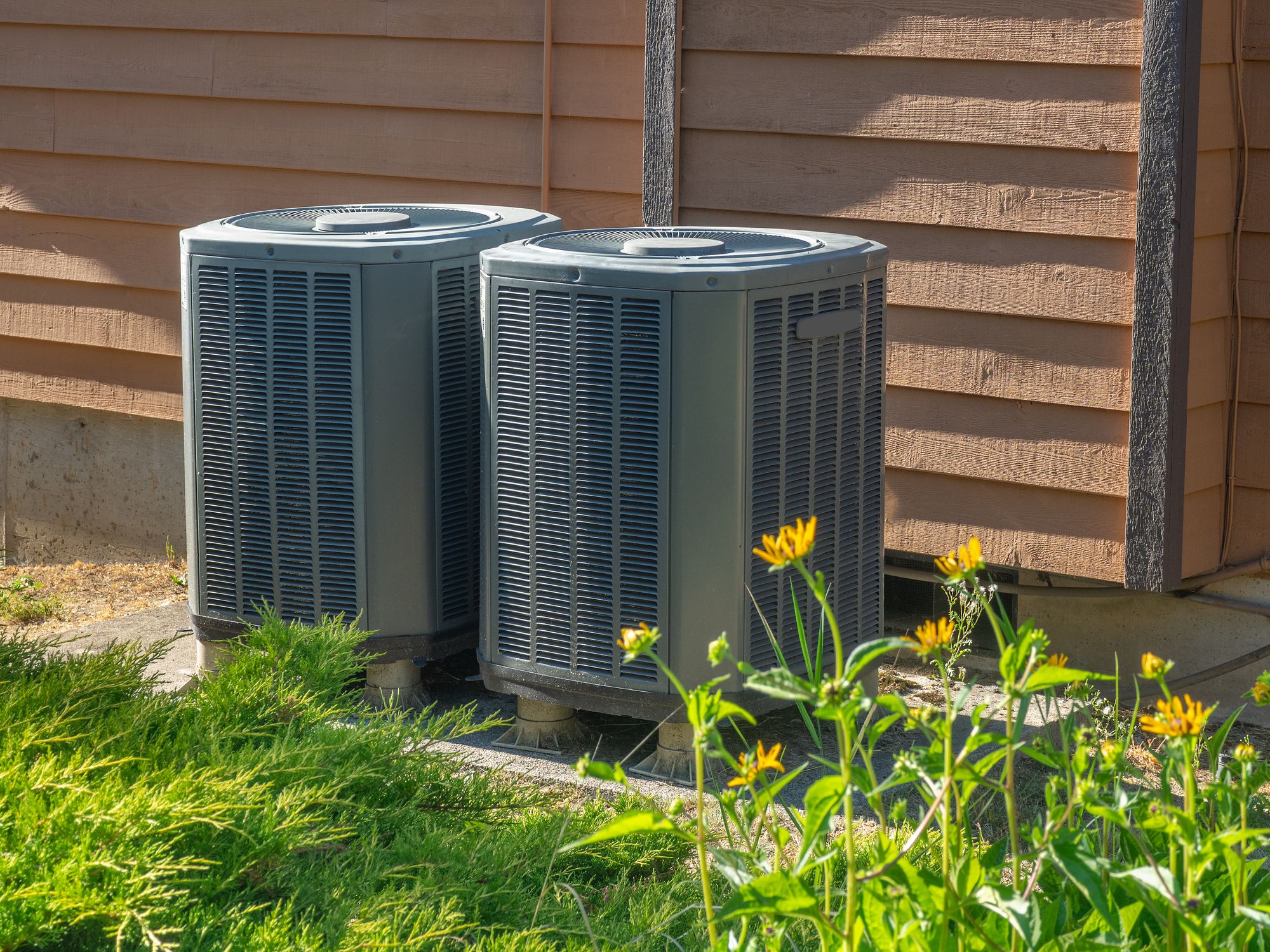Understand how HVAC experts assist with replacements seamlessly
Exploring the Essential Components of an Effective Cooling And Heating System
A reliable cooling and heating system is improved several important components that operate in harmony. Each part, from the thermostat to the ductwork, plays a vital function in maintaining convenience and power effectiveness. Recognizing these components is essential for enhancing performance and boosting interior air high quality. As one takes a look at these elements, the complex connections in between them disclose insights right into enhancing general system performance. What specific variables add most to this effectiveness?
The Role of the Thermostat in Cooling And Heating Performance

Although typically ignored, the thermostat plays a vital function in the performance of heating and cooling systems. HVAC experts. This tiny tool works as the main control center, controling temperature setups and guaranteeing ideal convenience within a room. By precisely noticing the ambient temperature, the thermostat connects with the heating, air, and air flow conditioning systems to keep the preferred environment
An efficient thermostat minimizes energy consumption by triggering the heating and cooling system only when necessary, therefore avoiding excessive heating or cooling. Modern clever and programmable thermostats boost this efficiency further by permitting users to set timetables and remotely readjust settings, adjusting to everyday regimens.
Furthermore, the placement of the thermostat is crucial; improper area can result in unreliable temperature readings, causing ineffective procedure. On the whole, a well-functioning thermostat not just boosts comfort however likewise contributes considerably to energy savings and the durability of the HVAC system.
Comprehending the Relevance of Air Filters
Air filters serve an important feature in heating and cooling systems by guaranteeing that the air flowing within a space continues to be healthy and tidy. These filters catch dust, allergens, and other contaminants, stopping them from being recirculated throughout the atmosphere. By catching these bits, air filters add to enhanced interior air quality, which can greatly profit owners' health and wellness, especially those with allergic reactions or respiratory system problems.
In addition, preserving tidy air filters improves the performance of cooling and heating systems. Clogged up filters can restrict airflow, creating the system to function more difficult to keep preferred temperatures, bring about enhanced power intake and greater energy bills. Frequently replacing or cleaning filters is an essential maintenance step that can prolong the life-span of heating and cooling tools. Inevitably, understanding the value of air filters enables house owners and building supervisors to take positive actions to assure a well-functioning, reliable heating and cooling system that advertises a secure and comfortable interior atmosphere.

The Performance of the Heater and Warm Pump
Furnaces and heatpump are essential parts of a/c systems, in charge of supplying warmth throughout colder months. Heaters run by home heating air with burning or electrical resistance, after that distributing it throughout the home using ducts. They typically supply fast home heating and can be sustained by gas, power, or oil, depending upon the system type.
Conversely, heatpump move warmth instead of generate it. They draw out warmth from the outside air or ground, even in reduced temperature levels, and transfer it indoors. HVAC experts. This dual capability enables warmth pumps to additionally give air conditioning in warmer months, making them functional alternatives for year-round climate control
Both systems need proper maintenance to ensure performance and long life. While heating systems excel in severe chilly, heatpump can be useful in moderate environments. Understanding their distinct capabilities help house owners in picking the most ideal option for their heating needs.
Checking Out the Air Conditioning System
The air conditioning unit is an important part of HVAC systems, readily available in various kinds to fit different demands. Comprehending the performance ratings of these systems is necessary for making educated choices about power intake and cost. This area will check out the diverse kinds of a/c unit and clarify how efficiency ratings effect efficiency.
Types of Air Conditioners
While numerous factors influence the choice of cooling systems, comprehending the different types available is critical for property owners and structure managers alike. Central air conditioning conditioners are made to cool whole homes or buildings, utilizing a network of ducts for air flow. Window units provide an even more localized remedy, ideal for single spaces or small rooms. Portable air conditioners supply flexibility, permitting individuals to move the unit as required. Ductless mini-split systems are another choice, combining the performance of main check my source systems with the convenience of zoning, as they require no ductwork. Ultimately, geothermal systems harness the planet's temperature for energy-efficient cooling. Each kind features unique advantages, making informed options crucial for reliable climate control.

Efficiency Ratings Clarified
Recognizing performance rankings is essential for picking the best a/c system, as these metrics supply understanding into the system's performance and power intake. One Get the facts of the most common ranking for ac system is the Seasonal Power Effectiveness Proportion (SEER), which measures the cooling result throughout a typical air conditioning period split by the total electrical energy input. A greater SEER suggests far better performance. In addition, the Energy Effectiveness Proportion (EER) is utilized for gauging performance under certain problems. Another important metric is the Energy Celebrity accreditation, which indicates that a system fulfills strict energy efficiency standards. By evaluating these ratings, consumers can make enlightened choices that not just optimize convenience but also minimize energy expenses and environmental influence.
The Significance of Ductwork and Airflow
Effective ductwork style and air movement monitoring play critical roles in the general effectiveness and performance of cooling and heating systems. Proper ductwork assurances that conditioned air is distributed equally throughout a room, lessening temperature variations and enhancing convenience. Well-designed ducts minimize resistance to airflow, decreasing the workload on HVAC equipment and ultimately reducing energy intake.
Air flow monitoring entails purposefully positioning vents and registers to enhance the circulation of air. This prevents usual concerns such as hot or chilly spots, which can take place when air movement is obstructed or improperly balanced. Furthermore, the ideal duct materials and insulation can better enhance efficiency by minimizing warm loss or gain during air transportation.
A reliable ductwork system not just adds to energy cost savings however can likewise prolong the lifespan of heating and cooling equipment by decreasing unnecessary pressure (HVAC experts). Consequently, recognizing the significance of ductwork and airflow is necessary for achieving peak a/c system performance
Routine Upkeep Practices to Improve Performance
Regular maintenance methods are essential for ensuring peak efficiency of heating and cooling systems. These methods consist of regular inspections, cleaning, and needed repair services to maintain the system running efficiently. Consistently changing air filters is crucial, as stopped up filters can block air movement and lower performance. In addition, technicians must inspect and tidy Get the facts evaporator and condenser coils to stop getting too hot and energy wastefulness.
Yearly specialist assessments are also recommended, as skilled professionals can determine potential concerns before they escalate. Lubing moving parts minimizes wear and tear, adding to a longer life-span for the system. Furthermore, making certain that the thermostat functions properly help in maintaining suitable temperature control.

Regularly Asked Inquiries
How Frequently Should I Change My Thermostat?
Thermostats must normally be changed every 5 to 10 years, depending on usage and innovation developments. Routine checks are advisable to assure peak performance, particularly if experiencing inconsistent temperature control or enhanced power costs.
What Size Air Filter Is Best for My A/c System?
The very best dimension air filter for a cooling and heating system differs by unit style. Typically, it's important to consult the proprietor's manual or examine the existing filter measurements to guarantee peak performance and air top quality.
Can I Set Up a Heatpump Myself?
Installing a heatpump individually is possible for knowledgeable individuals, but it requires knowledge of local codes and electric systems. Working with a specialist is advised to assure appropriate setup and perfect system efficiency.
Exactly how Do I Know if My Ductwork Is Reliable?
To determine ductwork performance, one should examine for leakages, measure air flow at vents, evaluate insulation top quality, and review temperature differences in between supply and return air ducts. Professional analyses can offer complete insights into general efficiency.
What Are Indications My Heating And Cooling Demands Immediate Upkeep?
Indicators that an a/c system needs immediate upkeep include unusual noises, irregular temperatures, boosted power expenses, unpleasant smells, and frequent cycling. Dealing with these concerns quickly can prevent additional damage and assurance peak system performance.
Air filters offer an essential function in HVAC systems by assuring that the air circulating within an area stays healthy and tidy. Furthermore, preserving clean air filters boosts the performance of Heating and cooling systems. Ductless mini-split systems are an additional option, integrating the performance of central systems with the convenience of zoning, as they require no ductwork. Understanding performance scores is important for selecting the ideal air conditioning device, as these metrics offer understanding right into the system's performance and power consumption. The finest dimension air filter for a HVAC system varies by device design.